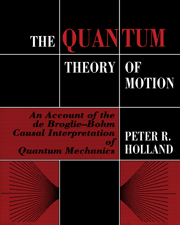 The Quantum Theory of Motion
The Quantum Theory of Motion Book contents
- Frontmatter
- Contents
- Preface
- 1 Quantum mechanics and its interpretation
- 2 Hamilton–Jacobi theory
- 3 Elements of the quantum theory of motion
- 4 Simple applications
- 5 Interference and tunnelling
- 6 The classical limit
- 7 Many-body systems
- 8 Theory of experiments
- 9 Spin ½: the Pauli theory
- 10 Spin ½: the rigid rotator
- 11 The Einstein–Podolsky–Rosen experiment and nonlocality
- 12 Relativistic quantum theory
- References
- Index
1 - Quantum mechanics and its interpretation
Published online by Cambridge University Press: 20 January 2010
- Frontmatter
- Contents
- Preface
- 1 Quantum mechanics and its interpretation
- 2 Hamilton–Jacobi theory
- 3 Elements of the quantum theory of motion
- 4 Simple applications
- 5 Interference and tunnelling
- 6 The classical limit
- 7 Many-body systems
- 8 Theory of experiments
- 9 Spin ½: the Pauli theory
- 10 Spin ½: the rigid rotator
- 11 The Einstein–Podolsky–Rosen experiment and nonlocality
- 12 Relativistic quantum theory
- References
- Index
Summary
The nature of the problem
The quantum world is inexplicable in classical terms. The predictions pertaining to the interaction of matter and light embodied in Newton's laws for the motion of particles and Maxwell's equations governing the propagation of electromagnetic fields are in flat contradiction with the experimental facts at the microscopic scale. A key feature of quantum effects is their apparent indeterminism, that individual atomic events are unpredictable, uncontrollable and literally seem to have no cause. Regularities emerge only when one considers a large ensemble of such events. This indeed is generally considered to constitute the heart of the conceptual problem posed by quantum phenomena, necessitating a fundamental revision of the deterministic classical world view.
Some of the principal phenomena, among those discussed in this book, are as follows:
(a) Self-interference: a beam of electrons sent one at a time through a barrier containing two apertures builds up through a series of localized detection events on a screen an interference pattern characteristic of waves (cf. the frontispiece and §5.1).
(b) Tunnelling: an α-particle trapped in a nucleus can pass through a potential barrier in a manner forbidden to a classical particle (§5.3).
(c) The stability of matter: atoms and molecules are found to exist only in certain discrete, or ‘stationary’, energy states. For this reason they do not ‘collapse’, the result predicted by classical electrodynamics. During transitions between stationary states (quantum jumps) an atom exchanges a discrete quantity of energy with the electromagnetic field (§§4.5, 7.6).
[…]
Information
- Type
- Chapter
- Information
- The Quantum Theory of MotionAn Account of the de Broglie-Bohm Causal Interpretation of Quantum Mechanics, pp. 1 - 26Publisher: Cambridge University PressPrint publication year: 1993
Accessibility standard: Unknown
Why this information is here
This section outlines the accessibility features of this content - including support for screen readers, full keyboard navigation and high-contrast display options. This may not be relevant for you.Accessibility Information
- 1
- Cited by